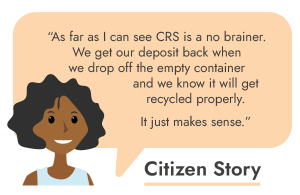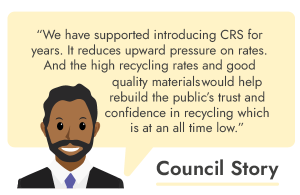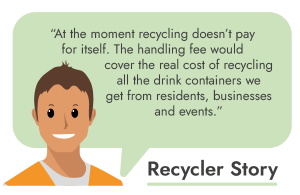Take Action for a Deposit Return Scheme
Sign our open letter calling for a Deposit Return Scheme in NZ
We are inviting organisations to add their signatures to an open letter calling on the Government to implement a Deposit Return Scheme (DRS, also known as CRS) for drink containers in New Zealand.
If you would like become a signatory, or be involved in any other way, please add your name here>>>
DRS proposal on the table
We can’t run the circular economy on grants and subsidies. Product stewardship is the tool that creates the revenue flows we need to fund reuse and recycling systems. A deposit return scheme is a critical stepping stone towards large scale, nationwide product stewardship schemes. It is also a proven way to significantly increase the recovery of drink containers for recycling or reuse.
- Everybody loves it – 98% of the responses to the Government public consultation in 2022 were in support. Local Government New Zealand (LGNZ) passed a 2018 waste remit in favour of the introduction of a CRS, with 96% support from Mayors. The majority of WasteMINZ members support the introduction of a CRS as soon as possible (WasteMINZ Manifesto, 2023)
- It works – high return rates, high quality recycling, low litter, a proven result in many countries over decades. Over 50 countries have deposit return schemes in place, with 20 more on the way, including all states of Australia, Europe, USA, and Canada.
- It pays for itself – the real costs of recycling are built into the purchase price of the drink, which takes the burden off ratepayers and local councils to subsidise drink container recycling.
- It sets us up with infrastructure – establishes a nationwide network of take-back sites that could also be used by emerging reuse and refill business models.
The Container Return Scheme was agreed to be implemented in late-2022, then deferred in March 2023. It is still on the shelf with the Government yet to make a final decision on whether to implement it or not.
It is our view that the design that was agreed was based on international best practice and we consider it a good fit for New Zealand. See the previous policy decisions on the DRS from Ministry for the Environment.



What is DRS?
A deposit return scheme (DRS) also known as ‘container return scheme’ or ‘bottle return’ or puts a small refundable deposit (like 10 or 20 cents) on a drink (like fizzy drinks, beer) paid for at the time of purchase. This money is then claimed back when the empty container is returned for recycling or reuse.
For many New Zealanders, it will be easier to remember a time when glass bottles could be returned for a refund, in the 1970s and 1980s!
A deposit return system would establish an effective and properly funded collection system for drink containers made from plastic, glass and metal across NZ. DRS is complementary to kerbside collections, helping to address the ‘away from home’ consumption of drinks. Existing infrastructure could be easily incorporated via a mixed returns model with drop off points at community recycling centres, transfer stations, community facilities, new depots as well as return to retail options.
Why do we support it?
New Zealand produces a mountain of beverage container waste and litter every day. We drink more than 2.57 billion beverages each year, but less than half of these are collected for recycling. This means that 1.7 billion containers are littered or landfilled in New Zealand each year, which equates to an alarming 4.66 million containers lost per day (MfE, 2022).
With a DRS, we could double our return rate so that 90% of these containers are recovered for recycling and reuse. This would reduce litter on our beaches, roadsides and public places by 60% – recovering an additional billion beverage containers, every year. This also means marked reductions in plastics entering our waterways and oceans. It would reduce greenhouse gas emissions across supply chains by replacing virgin input production with recycled materials.
It will also enable businesses and households to access recycling and reuse services they can trust.
All of this backs New Zealand’s clean, green brand, and aligns with global trading partners who have high recycling rates for beverage containers.
A DRS would also support regional economies. It would create about 2,400 new jobs and value-add opportunities in the collection, transport and processing of recovered packaging. It would attract investment to help establish the infrastructure and systems required for high quality recycling and bottle reuse. And it would create fundraising and revenue-raising opportunities for community groups, the resource recovery sector, and service organisations across the motu.
It would shift the cost of beverage container collection, recycling and litter clean-up off councils and ratepayers. There will be an estimated $50 million cost savings for councils in year one, which will offset some of the costs from kerbside standardisation and improve the quality of materials recovered. This includes the benefit values for kerbside collection and associated disposal costs (NZ$5.9 million per year), and the estimated kerbside container deposit value (financial benefits available to Councils and their recyclers)
No other single waste stream could be managed so easily by such an internationally proven system as a DRS, where recycling rates overseas of 85 – 95% are common with the right policy settings in place.
This information is sourced from the Ministry for the Environment’s Cabinet paper Container Return Scheme for Aotearoa New Zealand | Ministry for the Environment and the Envision New Zealand (2015) The InCENTive to Recycle: the case for a container deposit system in New Zealand, Auckland: Envision New Zealand
What do we want to see out of it?
It is our view that the scheme that has already been developed is based on global best practice, would be a good fit for New Zealand. This design would lead to a return rate of 90% for the following reasons:
- A comprehensive scope of beverages and beverage containers including materials made from plastic, metal, glass, and liquid paperboard
- A mixed-model return network with regulated mandatory take-back obligations for larger retailers (e.g. supermarkets) that sell beverages and a complementary network of depots and additional return points provided by community and the private sector, to establish high levels of convenience and scheme efficiency
- A refundable deposit on eligible beverage containers set at a level that incentivises a high return rate
- Deposit financial model arrangements, which means that beverage producers pay a deposit on each container sold to market, regardless of whether they are returned, with any unredeemed deposits used to fund the scheme
- A not-for-profit, industry-led organisation responsible for operationalising the scheme with strong checks and balances to ensure the scheme delivers the expected economic, public good and environmental outcomes
- Mandatory return rate targets of 85% from year 3 and 90% from year 5.
We recommend that the Government implements a high-performing Container Return Scheme. If the Waste Minimisation Act (WMA 2008) is amended in a suitable timeline the CRS could progress under this new legislative framework, otherwise it could progress through Parliament as standalone deposit return scheme legislation.
More resources and information
New Zealand groups and resources
Watch this space; we are developing new resources and collateral to share
Previous resources
The Zero Waste Network and NZ Product Stewardship Council previously created a series of factsheets in 2021 and 2022 that explained in detail what we would like to see in a DRS for Aotearoa NZ:
- Container Return: Better recycling, more refill systems and the building blocks of a circular economy (pdf)
- Container Return: CRS and Refillable Beverages complementary systems to reduce waste and emissions (pdf)
- Container Return: A Hybrid Return System for NZ’s Container Return Scheme (pdf)
Ministry for the Environment’s main website page on the Container Return Scheme, including policy briefings, cabinet papers, cost benefit analysis, and Regulatory Impact Statement: Container Return Scheme for Aotearoa New Zealand | Ministry for the Environment
New Zealand Product Stewardship Council (2021) Happy Returns, volume 2: An optimum model for New Zealand’s Container Recycling Scheme
New Zealand Product Stewardship Council (2019). Happy Returns: A proposed model for a Container Deposit Scheme for New Zealand.


